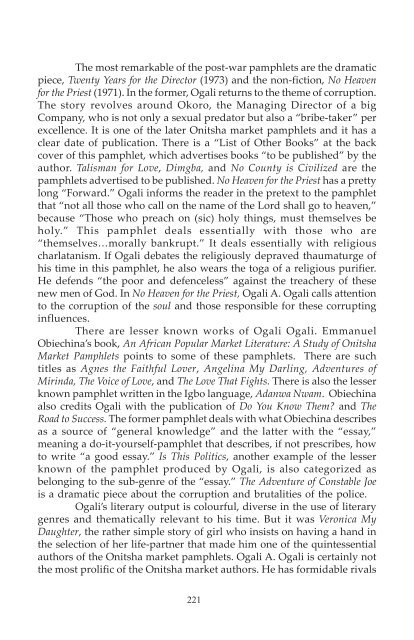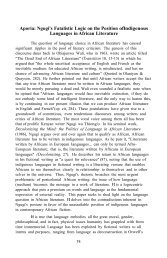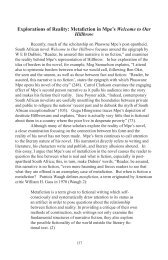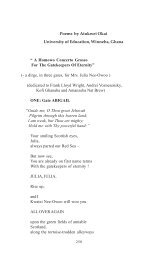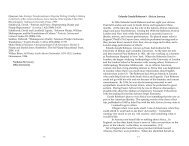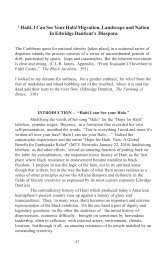JALA Winter-Spring 2008-Vol 2 No 1 - African Literature Association
JALA Winter-Spring 2008-Vol 2 No 1 - African Literature Association
JALA Winter-Spring 2008-Vol 2 No 1 - African Literature Association
Create successful ePaper yourself
Turn your PDF publications into a flip-book with our unique Google optimized e-Paper software.
The most remarkable of the post-war pamphlets are the dramatic<br />
piece, Twenty Years for the Director (1973) and the non-fiction, <strong>No</strong> Heaven<br />
for the Priest (1971). In the former, Ogali returns to the theme of corruption.<br />
The story revolves around Okoro, the Managing Director of a big<br />
Company, who is not only a sexual predator but also a “bribe-taker” per<br />
excellence. It is one of the later Onitsha market pamphlets and it has a<br />
clear date of publication. There is a “List of Other Books” at the back<br />
cover of this pamphlet, which advertises books “to be published” by the<br />
author. Talisman for Love, Dimgba, and <strong>No</strong> County is Civilized are the<br />
pamphlets advertised to be published. <strong>No</strong> Heaven for the Priest has a pretty<br />
long “Forward.” Ogali informs the reader in the pretext to the pamphlet<br />
that “not all those who call on the name of the Lord shall go to heaven,”<br />
because “Those who preach on (sic) holy things, must themselves be<br />
holy.” This pamphlet deals essentially with those who are<br />
“themselves…morally bankrupt.” It deals essentially with religious<br />
charlatanism. If Ogali debates the religiously depraved thaumaturge of<br />
his time in this pamphlet, he also wears the toga of a religious purifier.<br />
He defends “the poor and defenceless” against the treachery of these<br />
new men of God. In <strong>No</strong> Heaven for the Priest, Ogali A. Ogali calls attention<br />
to the corruption of the soul and those responsible for these corrupting<br />
influences.<br />
There are lesser known works of Ogali Ogali. Emmanuel<br />
Obiechina’s book, An <strong>African</strong> Popular Market <strong>Literature</strong>: A Study of Onitsha<br />
Market Pamphlets points to some of these pamphlets. There are such<br />
titles as Agnes the Faithful Lover, Angelina My Darling, Adventures of<br />
Mirinda, The Voice of Love, and The Love That Fights. There is also the lesser<br />
known pamphlet written in the Igbo language, Adanwa Nwam. Obiechina<br />
also credits Ogali with the publication of Do You Know Them? and The<br />
Road to Success. The former pamphlet deals with what Obiechina describes<br />
as a source of “general knowledge” and the latter with the “essay,”<br />
meaning a do-it-yourself-pamphlet that describes, if not prescribes, how<br />
to write “a good essay.” Is This Politics, another example of the lesser<br />
known of the pamphlet produced by Ogali, is also categorized as<br />
belonging to the sub-genre of the “essay.” The Adventure of Constable Joe<br />
is a dramatic piece about the corruption and brutalities of the police.<br />
Ogali’s literary output is colourful, diverse in the use of literary<br />
genres and thematically relevant to his time. But it was Veronica My<br />
Daughter, the rather simple story of girl who insists on having a hand in<br />
the selection of her life-partner that made him one of the quintessential<br />
authors of the Onitsha market pamphlets. Ogali A. Ogali is certainly not<br />
the most prolific of the Onitsha market authors. He has formidable rivals<br />
221


